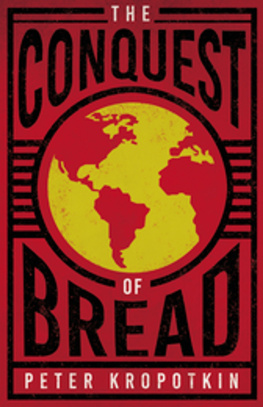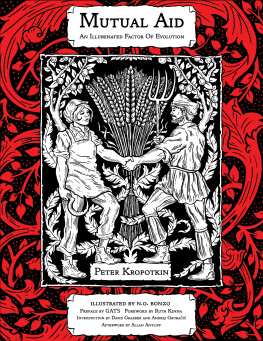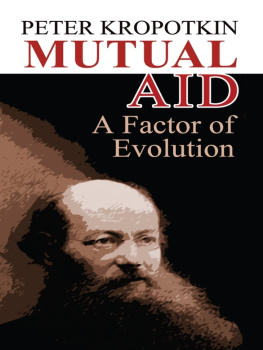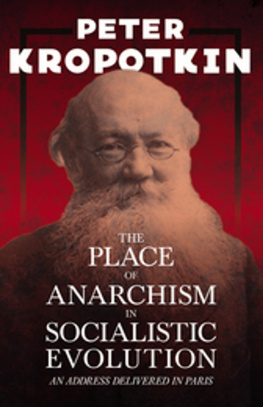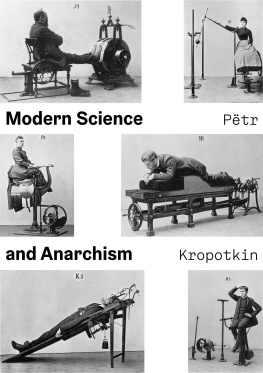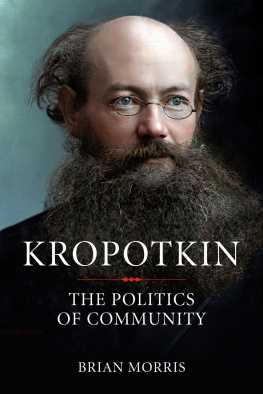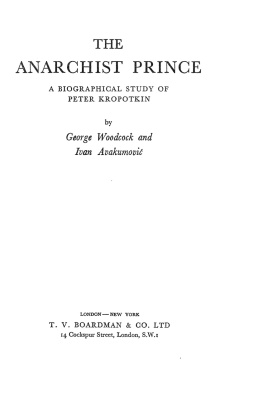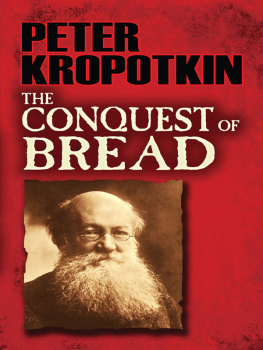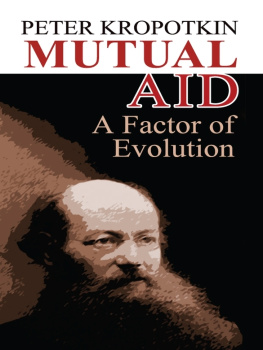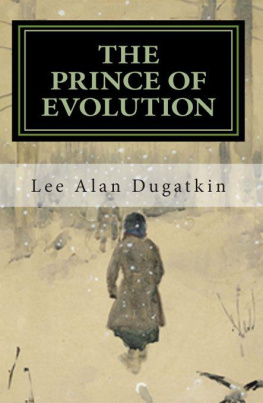Transcriber's Note:
Click on the page number to see an image of the original page.
Peter Alexeivitch Kropotkin Born in the Old Esquerries' Quarter of Moscow in 1842
Peter Alexeivitch Kropotkin
Born in the Old Esquerries' Quarter of Moscow in 1842
LIVES OF GREAT ALTRURIANS
COMRADE KROPOTKIN
BY VICTOR ROBINSON
"To liberate one's country!" she
said. "It is terrible even to utter
those words, they are so grand."
Turgenev : "On the Eve."
PRICE, ONE DOLLAR
THE ALTRURIANS
12 Mount Morris Park West
New York City
1908
This book is not copyrighted
How could it be?
CONTENTS
| Dedication |
| Foreword | PAGE |
| Under Nicholas I. |
| Scenes from Serfdom |
| Explorations |
| The Nihilists |
| The Terrorists |
| Sophia Perovskaya |
| The Fortress of Peter and Paul |
| Brothers |
| The Open Gate |
| From the Printing Press |
| In Later Life |
| The Historian of the Revolution |
ILLUSTRATIONS
| Peter Kropotkin | FACING
PAGE |
| The Scaffold's Bride |
| Nicholas Chaykovsky |
| Sophia Perovskaya |
| Before the Search |
| The Cossacks |
TO GEORGE KENNAN
I dedicate this work. I need not say why. He will know
Everyone will know. With tears, during the night,
I have read your book, thou earnest truth-seeker.
O compassionate traveler, what a man you must have been!
For the weary Siberian exiles called you
'Dear George Ivanovich!' With a heart
Full of thankfulness for the work you have done,
I lay my bitter and bloody pages at your feet.
Victor Robinson
FOREWORD
Bernard Shaw calls us a nation of villagers. To a large extent this appellation holds good. We are so self-sufficient unto ourselves that the most important events in the world leave us cold if they take place outside of the realm of the star-spangled banner.
A wonderful and terrible thing is happening in the largest empire on earth; a downtrodden people is engaged in a death-grapple with its merciless rulers; and never were masters so inhuman, and never were people so heroic. In comparison with this titanic struggle the French Revolution itself sinks into insignificance. But what do we know about it? And what do we care? Russia is far away.... Once in a while the report of a particularly atrocious massacre, or a particularly cruel torture inflicted upon a young girl revolutionist will shock our sensibilities, will cause a pang in our hearts, will perhaps make our hair stand on end,but in a day or two we forget all about it. We are so busy!
No wonder that this battle-drama appeals with special force, and exerts a special charm on the young of all lands,the young who worship Freedom, and whose breasts beat warmly for Ideals. No wonder therefore that it appeals to Victor Robinson.
This essay was written at the age of twenty, and the youth of the author will serve as an apology, if apology be needed, for the sharpness of some of the expressions found in these pages. But is excuse really necessary? I hardly think so. No language can be too strong when condemning the Russian Bureaucracy, no judgment can be too severe when pronounced on czardom and its cruel minions. In fact the English language sometimes seems inadequate....
A remarkable commentary on the conditions in Russia is the fact that he who studies them carefully and thoroly, be he the gentlest and sweetest youth who would not harm a fly or tread on a worm, becomes saturated with the conviction that in Russia, the rebel's bomb and pistol and dagger are not only legitimate and necessary, but even noble weapons of defense and offense.
I refrain from any remarks as to the intrinsic value of this book, as it is perhaps not quite proper for a father to criticize, favorably or otherwise, the literary productions of his son. One comment however I would like to make: For one who is utterly unfamiliar with the Russian language, and who has worked alone and unaided, (in the leisure moments left over by strenuous college studies), the author has accomplished a rather noteworthy feat. He has succeeded in imbuing the book with such an atmosphere, in presenting such vivid and faithful glimpses of Russian life and literature, and exhibiting such wide and varied knowledge of the subject, that even a Russian writer would not be ashamed to have his name appear on the title-page of this volume.
Love understandeth all things.
Dr. William J. Robinson.
New York City, November 11, 1908.
UNDER NICHOLAS I.
I understand that doom awaits him who first rises against the oppressors of the people. When has Liberty been redeemed without victims? Fate has already condemned me. I shall perish for my native land. I feel it, I know it, and gladly bless my destiny.Ryleev.
A fabled king of Thrace fed his horses on human flesh, but a real czar of Russia washed his streets with blood. On his accession to the red throne, the Iron Despot immediately expelled progress from his empire by butchering the Decembriststhose pioneers of freedom who fought for a constitution and the abolition of serfdom. Exiles began to tramp the lonely Siberian highway, and from the time of that Nicholas I. to this Nicholas II.a period of 75 yearsover a million political prisoners have taken the 'long journey.'
The mighty country was turned into a military camp. The term of service was twenty-five years. The life was so hard that when a man was recruited, his relatives followed him as if to his grave. His mother ran after him, and sometimes fell dead on the spot. The emperor spent his time reviewing troops and altering uniforms.
During this reign originated the widespread system of stealing Jewish children from their homes, separating them from their families, severing them from their faith, and bringing them up to serve in the army. These were the Cantonists. Thus it came about that when a mother of Israel gave birth to a boy, she did not rejoice as for one born and living, but lamented as for one dead and departed. (Sometimes Jewish mothers saved their children from the army by cutting off their fingers, or taking out one of their eyes).
Liberty was so shackeled she did not even dare weep aloud. Since that unlucky day when Ryleev, Pestel, Bestuzhev, Kakovsky and Muraviov-Apostol dangled from a tall straight post and a strong crossbar, no revolutionist arose to oppose tyranny. During all the many years of the reign of Nicholas-with-the-Stick, no ray of light brightened a darkened nation, no torch glimmered in the bloody gloom. Hope was dead. Freedom was buried. Literature was in exile. Knowledge lay in a closed coffin. But censorship was alive, and autocracy had more eyes than Argus.
An anonymous pamphlet, toward the end of his reign, cried out that the czar had rolled a great stone before the door of the sepulchure of Truth, that he had placed a strong guard round her tomb, and in the exultation of his heart had exclaimed, "For thee, no resurrection!"
So thoroly was liberalism crushed, so completely was absolutism supreme, that 'Nikolaus Palkin' walked the streets of bleeding Russia unattended and unafraid.
Alas, when a nation has only knees to bend, but no hands to strike!
After his shadow had obscured the sun for a quarter of a century, a brilliant festival was given in his honor at Moscowcalled the Holy City because it contains a Miracle Monastery for glorifying God and a Kremlin Fortress for crucifying Man. It was a fancy-dress ball, and a thousand gorgeous uniforms were there, from the leather coat of the Tungus to the embroidered flummery of the chamberlain. In this affair the children of the nobility played an important part. They were lavishly attired, and each carried an ensign representing the arms of the provinces of the Russian empire. At a given signal the little emblem-bearers began to march, and on reaching the purple platform upon which the royal family sat, all standards were lowered. The inflexible autocrat viewed the scene with satisfactionall the provinces bowed before him. When the children retired to the rear of the immense hall, someone pulled the smallest of the boys from the ranks and placed him on the imperial elevation. The lad was arrayed as a Persian prince, and wore a jewel-covered belt and a high bonnet. Nicholas I. looked at his chubby face all surrounded with pretty curls and taking him to the czarevna Marie Alexandrovna, said in his military voice, "This is the sort of boy you must bring me." The woman was gravid at the time, and the soldier-like joke made her blush.

